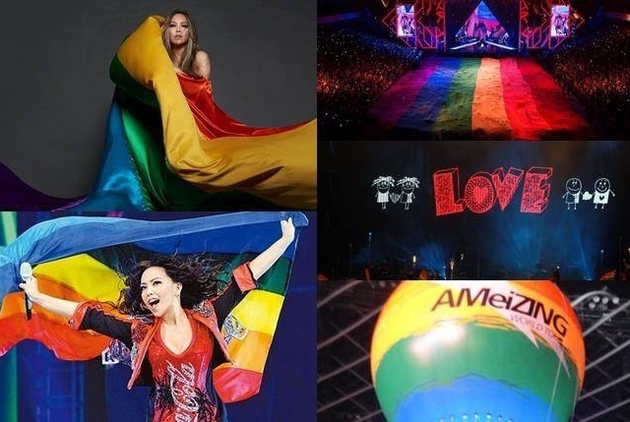Taiwan's Source of Pride
'Straight' Gays, Great Parades, and A-mei

Source:CUST General Education Center
In 2003, Asia's first gay parade was held in Taiwan. From the few hundred who marched that day, the parade now draws 65,000 people from around Asia.
Views
'Straight' Gays, Great Parades, and A-mei
By Luo Yu-jiaFrom CommonWealth Magazine (vol. 514 )
People have asked me what word I would choose to describe 2012.
Impulsively, I immediately think of the word "enraging." Combing through the public issues of recent years, government policy missed the mark in many areas in 2012. GDP growth was trapped at about 1 percent, but what did rise sharply was the extra funding requested to keep Taiwan's fourth nuclear power plant project alive. Urban renewal programs, intended to make our cities more beautiful, turned out to be causes of injustice. The rise in electricity and fuel prices, a new capital gains tax on equities, and a second-generation national health insurance plan ensured that Formosa could still face peril in the future. 2012 clearly wasn't good to anybody. Truly enraging.
But from another perspective, even if it was a bad year, we were still able to produce fine wine. Even if the New Year resonates with rage, we cannot let ourselves be mired down in it. The motivation pushing us forward is definitely not rage. What is blossoming around this island is not conflict, but a rainbow. We feel proud that the gender equality movement is ascending, nudging society little by little toward goodness, and we are fortunate to have "straight" gays, a great parade and Chang Hui-mei (A-mei).
The Taiwan LGBT Pride parade has made it into its 10th year.
It has always been more than just a parade. Its English name – "Taiwan LGBT Pride" – is meant to demonstrate gay pride and encourage striding forward for love without fear. After 10 years, the parade itself has become a source of pride for Taiwan.
It may be hard to imagine that in the Taiwan gay parade's first year in 2003, only a few hundred people participated. I was one of them. Many marchers covered their faces with masks, unable to truly stand out despite standing up for themselves. But after a short 10 years, the number of people participating in the parade has exploded to 65,000, drawing gays from Hong Kong, Japan, Singapore, Malaysia and China. The number of participating heterosexuals – those nicknamed "straight gays" – has also risen steadily over the years.
They are straight parents who bring their children. They are young students who are friendly with gays. It's a mother who holds a placard reading, "Why can I love a man but my son can't?"
It is these people who have not only enabled Taiwan to sustain the tradition of Asia's first gay parade, but have also transformed it into Asia's biggest gay parade, its numbers dwarfing the parades of a few thousand people held in major cities such as Hong Kong and Tokyo.
Asia's Biggest Gay Parade
With so many participants and so many miles marched, it's impossible to calculate with any precision if we have traveled a distance long enough to circle the globe a few times. But I think we have.
Even though the cheerful marchers are undisciplined, the parade always manages to wind its way to its final destination. So what is the final destination of the gay rights movement as a whole? The core slogan of the 2012 gay parade – "Marriage Revolution – Equal Marriage Rights, Diversity in Partnerships" – represented an appeal for gays to have the right to choose whether or not they want to get married. The movement also emphasized moving toward a system that is more accommodating of "diversity in partnership forms" and ultimately allows every person the right to choose whom they deem to be their significant other.
Endorsing the campaign, pop diva A-mei was the first person to sign a petition in support of diverse forms of families. At a later concert that drew a crowd at least as big as the parade's, she said standing on stage draped in a rainbow flag, "Every person has the right to love. Any form of love is worthy of respect." Any love, unconditional love, the freedom to love.
In the end, I chose the word "love" to describe 2012. Only pure love can melt the rage generated by injustice. We should love everything in this world – aliens, amoebas, and gays. Because of love, we are blessed with the good fortune of having "straight gays," our big parade and A-mei, making Taiwan feel truly proud.
Luo Yu-jia is a young poet and gay rights activist who has a large following among Taiwan's younger generation.
Translated from the Chinese by Luke Sabatier
The above article is featured in the new CommonWealth Magazine website, "Independent Opinion@CommonWealth Magazine" (http://opinion.cw.com.tw). The goal of this Chinese-language website is to present independent voices from Taiwan and the greater Chinese-speaking world, across the broadest spectrum of age, expertise, group identity and vantage point.
For its inaugural edition, "Independent Opinion" has invited ten writers to share their thoughts on two different themes: "Taiwan's sources of injustice," and "Taiwan's sources of pride." What aspects of Taiwanese society are most unfair, and call out for its leaders to urgently address? And what things should Taiwanese people be most proud of, and delighted to share with the world?






